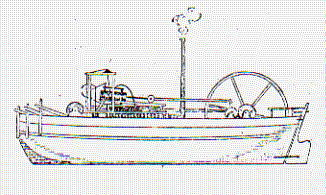Brecanburg Shipwright Company
This article is incomplete because it is pending further input from participants, or it is a work-in-progress by one author. Please comment on this article's talk page to share your input, comments and questions. Note: To contribute to this article, you may need to seek help from the author(s) of this page. |
 | |
| Private | |
| Industry | Shipwrights |
| Founded | March 13, 1814 in Brēcænburg |
| Founders | Judd Ben & Dejen Fulton |
| Headquarters | Brēcænburg , |
Brēcænburg Scipwyrhta Intinga (Hereafter: BSI)[1], often shortened as BSI, is a major shipbuilding firm based in the Eā district on the River Trinda that runs through the city of Brēcænburg.
History
Origin
The company was founded by Judd Ben, in the year 1814, and originally endeavored to provide an indigenous supply of steam powered boats for the local market. This niche arose during the early quarter of the 19th century, when Fȳrish industry relied heavily on river craft for the transportation of resources and produce, which was mainly provided by horse drawn barge, or rowboat; Naturally, horse drawn barges were limited to areas with access to towpaths, and rowboats required a large crew for relatively little cargo. Casaterran produced steam powered boats were becoming more of a common sight on the rivers of Fȳrland at this time, and although they served to provide the best functionality, they were prohibitively expensive, and out of the reach of all but the largest commercial enterprises; Their cost coming from having to be imported, or constructed in Fȳrland using imported experts, and paid licensing.
Judd Ben, seeing this gap, successfully managed to design a steamboat using his experience gained while managing Casaterran shipwrights in Tǣl-Arēnde, on the northern coast of Fȳrland. His design was rudimentary, but allowed for construction of the relatively complicated steam engine to be local, and thus costs associated with the most complex component were vastly lower compared with Casaterran produced versions. However, Judd was not an engineer, and although his design concept was sound, he struggled to find a local firm to complete his steam engine design. His concept would remain as such, until Judd came into contact with Dejen Fulton, in the Þrīe Cranas Inn[2] in the center of Brēcænburg; Dejen, recently made redundant from his post, was an engineer by trade, and upon striking a conversation with Judd, would find common interests in ship construction. Dejen would hear of Judd's plans, and became somewhat infatuated with the idea of competing against his Casaterran ex-employer, and so accepted Judd's call for help.
The result of Judd's and Dejen's work would be their version of a horizontal steam engine, which while somewhat crude, could be manufactured locally. All that remained was a running demonstration, which would be funded by the pair out of their own pockets, and which they hoped, would be enough to garner support from the local market. Their steamboat, named the Judd-Dejen, was constructed inside a rented housed slipway on the River Trinda in their free time. Major components, such as the massive flywheel, were outsourced to local firms, and more minor components were produced by themselves, in their own workshop, or similarly outsourced; Each outsourcing by the pair was carefully considered, to keep the full extent of the project under wraps.
Their diligence and devotion would eventually pay off, when Judd and Dejen's steamboat was finally completed, on March 16th, 1816, exactly almost two years since Judd's endeavour had begun; The pair launched the craft on the 17th of March, which was a Saturday, and begun some waterborne testing, while a somewhat startled public gathered at the waters edge. The unveiling of the Judd-Dejen was met with a flurry of locals on the 22nd of March, as the steamboat took to the water on the River Trinda for the second time; Local businessmen, reporters, families, and passersby all gathered and watched the demonstration. The Judd-Dejen, towing two 70-ton barges, managed to make 4 mph in the strong river current, all to the amazement of the crowd; The demonstration was a success, and before long, requests for craft powered by Judd and Dejen's steam engine began to arrive.
